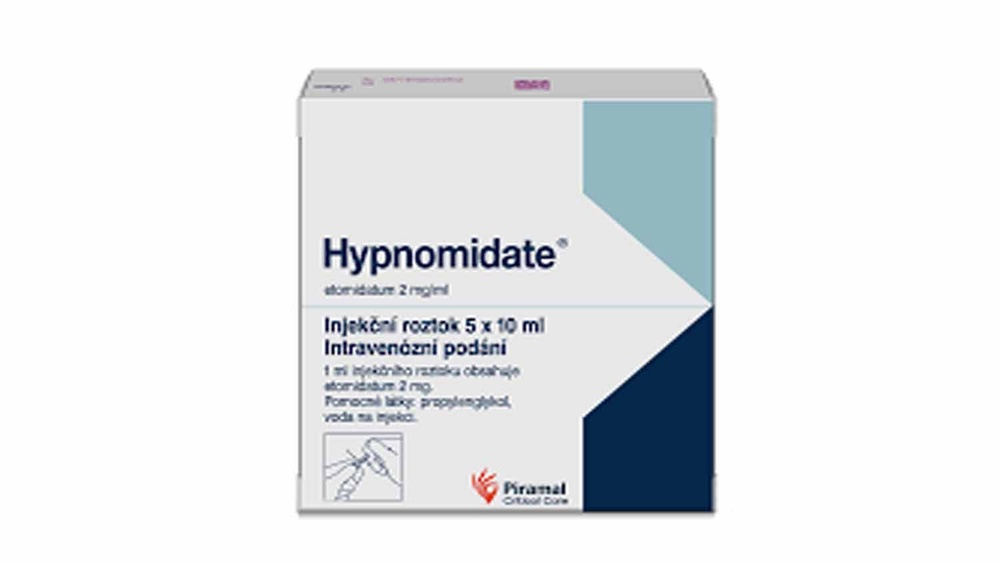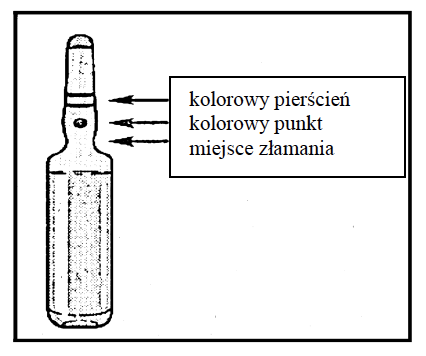

Hipnomidate

Ask a doctor about a prescription for Hipnomidate

How to use Hipnomidate
Leaflet accompanying the packaging: information for the user
Hypnomidate, 2 mg/ml, solution for injection
Etomidate
Read the leaflet carefully before using the medicine, as it contains important information for the patient.
- Keep this leaflet, you may need to read it again.
- If you have any further questions, ask your doctor or pharmacist.
- This medicine has been prescribed for you only. Do not pass it on to others. It may harm them, even if their symptoms are the same as yours.
- If you experience any side effects, including any not listed in this leaflet, please tell your doctor, pharmacist, or nurse. See section 4.
Table of contents of the leaflet
- 1. What is Hypnomidate and what is it used for
- 2. Important information before using Hypnomidate
- 3. How to use Hypnomidate
- 4. Possible side effects
- 5. How to store Hypnomidate
- 6. Contents of the packaging and other information
1. What is Hypnomidate and what is it used for
The active substance of Hypnomidate is etomidate.
Hypnomidate is indicated for the induction of general anesthesia, as well as for supplementary anesthesia in local anesthesia.
Hypnomidate is indicated for short diagnostic procedures or procedures performed on an outpatient basis, where rapid recovery of the patient is necessary.
Hypnomidate is particularly indicated in cardio surgery and in patients with heart disease.
2. Important information before using Hypnomidate
When not to use Hypnomidate
If the patient is allergic to the active substance or any of the other ingredients of this medicine (listed in section 6).
An allergic reaction can be recognized as: rash, itching, swelling of the face and lips, shortness of breath.
Any such reactions should be reported to the doctor immediately.
Warnings and precautions
The medicine should be used with caution in patients:
- with adrenal insufficiency, such as in patients with sepsis;
- with liver cirrhosis;
- who have received neuroleptic, opioid, or sedative drugs (see below - Hypnomidate and other medicines);
- of advanced age.
Single inducing doses of etomidate may lead to transient adrenal insufficiency and decreased cortisol levels in the serum.
Etomidate should be used with caution in critically ill patients, including those with sepsis, as it has been associated with an increased risk of death in some studies.
Hypnomidate must be administered only by doctors trained in the administration of endotracheal intubation. Resuscitation equipment must be available in case of respiratory disturbances and apnea.
Induction of general anesthesia with Hypnomidate may be accompanied by a slight, transient decrease in blood pressure. In weakened patients, the doctor will take appropriate measures.
The use of Hypnomidate may be associated with the occurrence of spontaneous muscle movements, especially if no premedication (administration of a sedative before administration of the anesthetic) has been used.
Hypnomidate does not have analgesic properties and therefore, during surgical procedures, an appropriate analgesic should be administered - 1-2 minutes before injection of Hypnomidate.
Hypnomidate and other medicines
Tell your doctor or pharmacist about all medicines you are taking, or have recently taken, and about medicines that are available without a prescription.
The effect of Hypnomidate may be enhanced by:
- neuroleptic drugs - used to treat mental illnesses,
- opioids - painkillers, e.g. morphine, fentanyl,
- sedative drugs,
- alcohol. Hypnomidate may enhance the effect of:
- drugs that lower blood pressure.
Pregnancy, breastfeeding, and fertility
If you are pregnant or breastfeeding, think you may be pregnant, or plan to have a child, ask your doctor before using this medicine. The doctor will then decide whether to use Hypnomidate.
During treatment and for 24 hours after using Hypnomidate, do not breastfeed.
Reproduction studies in animals have not shown that Hypnomidate, when used at recommended doses, affects fertility.
Driving and using machines
Hypnomidate has a significant impact on the ability to drive vehicles and operate machines. It is not recommended to operate potentially hazardous machinery and drive vehicles for the first 24 hours after administration. The time to return to normal fitness may vary depending on the duration of the procedure, the total dose administered, and other medications used.
Therefore, the decision to allow the patient to drive vehicles and operate machines must be made by the anesthesiologist.
Hypnomidate contains propylene glycol
Hypnomidate contains propylene glycol, which may cause skin irritation.
3. How to use Hypnomidate
Hypnomidate is intended for administration only by medical personnel.
In case of doubts, consult a doctor.
How to administer Hypnomidate:
- only intravenously - in slow injection or infusion;
- may be diluted with physiological sodium chloride solution or glucose solution;
How much Hypnomidate to administer
The amount of medicine used is decided by the doctor, depending on
- the type of surgical procedure,
- body weight,
- age
- general health condition.
The effective dose inducing sleep is 0.3 mg/kg body weight. Therefore, in adult patients, one ampoule usually suffices to induce sleep lasting 4-5 minutes.
Sleep may be prolonged by administering additional doses of Hypnomidate, not more than 3 ampoules (30 ml).
Elderly patients
In elderly patients, a single dose of 0.15-0.2 mg/kg body weight is administered, which is then individually adjusted depending on the patient's reaction (see section 2. Important information before using Hypnomidate).
Children
In children under 15 years of age, it may be necessary to increase the dose in order to achieve the same depth of sleep and sleep time as in adults. Sometimes it is necessary to increase the dose by about 30% of the usual dose for adults.
Using more than the recommended dose of Hypnomidate
In case of overdose of etomidate administered as a bolus, sleep becomes deeper and may be accompanied by hypotension, inhibition of adrenal cortical function, respiratory depression, or even apnea. In case of apnea, it is necessary to take appropriate supportive measures for breathing. Disorientation and prolonged recovery may also occur.
4. Possible side effects
Like all medicines, Hypnomidate can cause side effects, although not everybody gets them.
In clinical trials, the most commonly reported side effects were dyskinesias and vein pain.
The following side effects (including those listed above) were observed during clinical trials or after the marketing of Hypnomidate.
- Very common side effects (may affect at least 1 in 10 people):
- dyskinesias (movement disorders);
- decreased cortisol levels.
Common side effects (may affect less than 1 in 10 people):
- myoclonic seizures;
- vein pain, decreased blood pressure;
- apnea, hyperventilation (accelerated or deepened breathing), stridor;
- vomiting, nausea;
- rash.
Uncommon side effects (may affect less than 1 in 100 people)
- hypertonia (increased muscle tension), involuntary muscle contractions, oculogyric crisis;
- bradycardia (slow heart rate), extrasystoles, ventricular extrasystoles;
- phlebitis, hypertension (high blood pressure);
- hypoventilation (slowing and weakening of breathing), hiccups, cough;
- excessive salivation;
- flushing;
- muscle stiffness;
- pain at the injection site;
- anesthesia complications, delayed recovery of consciousness after anesthesia, insufficient analgesic effect, nausea during procedures.
Side effects with unknown frequency (frequency cannot be estimated from available data):
- hypersensitivity reactions (including anaphylactic shock, anaphylactic reactions, and pseudo-anaphylactic reactions);
- adrenal insufficiency;
- seizures (including grand mal seizures);
- cardiac arrest, complete atrioventricular block;
- shock, thrombophlebitis (deep and superficial);
- respiratory depression, bronchospasm (including death);
- Stevens-Johnson syndrome (characterized by transient blisters on mucous membranes, mainly in the mouth and genital organs, which burst to form painful ulcers that make eating difficult. Fever and joint pain may also occur.), urticaria;
- trismus.
Reporting side effects
If you experience any side effects, including any not listed in this leaflet, please tell your doctor, pharmacist, or nurse. Side effects can be reported directly to the Department of Monitoring of Adverse Reactions to Medicinal Products of the Office for Registration of Medicinal Products, Medical Devices, and Biocidal Products
Al. Jerozolimskie 181C, 02-222 Warsaw
Phone: +48 22 49 21 301
Fax: +48 22 49 21 309
Website: https://smz.ezdrowie.gov.pl
Side effects can also be reported to the marketing authorization holder or parallel importer.
By reporting side effects, you can help provide more information on the safety of this medicine.
5. How to store Hypnomidate
Store in a temperature below 25°C.
The medicine should be stored out of sight and reach of children.
Do not use this medicine after the expiry date stated on the packaging. The expiry date refers to the last day of the month.
Medicines should not be disposed of via wastewater or household waste. Ask your pharmacist how to dispose of medicines no longer required. This will help protect the environment.
6. Contents of the packaging and other information
What Hypnomidate contains
- The active substance of Hypnomidate is etomidate. Hypnomidate ampoules contain 10 ml (20 mg etomidate) of ready-to-use solution (2 mg etomidate per 1 ml of solution).
- The other excipients are: propylene glycol and water for injections.
What Hypnomidate looks like and contents of the pack
A 10 ml ampoule containing a sterile, clear, colorless aqueous solution for intravenous injection. 1 pack contains 5 ampoules of 10 ml each.
For more detailed information, please contact the marketing authorization holder or parallel importer.
Marketing authorization holder in the Czech Republic, country of export, and manufacturer:
Piramal Critical Care B.V.
Rouboslaan 32, 2252 TR, Voorschoten
Netherlands
Parallel importer:
Swiss2Care Sp. z o.o. Sp. k.
ul. Mostowa 38/1
87-100 Toruń
Repackaged by:
CEFEA Sp. z o.o. Sp. k.
ul. Działkowa 56
02-234 Warsaw
Marketing authorization number in the Czech Republic, country of export: 05/160/80-C
Parallel import authorization number: 380/22 Date of approval of the leaflet: 17.10.2022
[Information about the trademark]
--------------------------------------------------------------------------------------------------------------------------
THE FOLLOWING INFORMATION IS INTENDED ONLY FOR HEALTHCARE PROFESSIONALS
THIS PRODUCT MUST BE ADMINISTERED ONLY BY DOCTORS TRAINED IN THE ADMINISTRATION OF ENDOTRACHEAL INTUBATION. WHEN USING HYPNOMIDATE, RESUSCITATION EQUIPMENT MUST BE AVAILABLE IN CASE OF RESPIRATORY DEPRESSION AND APNEA.
1. Preparation of the medicinal product for use
Before opening the ampoule, put on protective gloves.
Ampoules
- 1. Hold the ampoule between the thumb and index finger, leaving the free end of the ampoule.
- 2. With the other hand, hold the end of the ampoule, placing the index finger on the end of the ampoule and the thumb on the colored dot, parallel to the colored ring on the end of the ampoule.
- 3. Holding the thumb on this dot, break the end of the ampoule energetically, while keeping the rest of the ampoule firmly with the other hand.


In case of accidental exposure of the skin to the product, wash the area with water. Avoid using soap, alcohol, or other cleaning agents that may cause chemical or mechanical skin damage.
2. Special warnings and precautions for use
Hypnomidate should be administered only intravenously.
Induction of anesthesia with Hypnomidate may be accompanied by a slight, transient decrease in blood pressure, related to the decrease in peripheral vascular resistance. In weakened patients, in whom hypotension may be dangerous, the following measures should be taken:
- 1. The patient should be placed in a supine position.
- 2. Access to a vein should be obtained to ensure adequate blood volume.
- 3. Hypnomidate should be injected slowly (e.g. 10 ml over 1 minute).
- 4. If possible, avoid using other medicines for induction of anesthesia.
When using Hypnomidate, resuscitation equipment must be available in case of respiratory depression and apnea.
The doses of etomidate used for induction of anesthesia caused a decrease in cortisol and aldosterone levels in the serum. In patients under severe stress, especially those with adrenal cortical dysfunction, cortisol supplementation should be considered.
The direct consequence of etomidate action, if it was administered in continuous infusion or multiple doses, may be prolonged suppression of endogenous cortisol and aldosterone secretion. Therefore, this method of administration should be avoided.
In such cases, stimulation of the adrenal gland with ACTH (adrenocorticotropic hormone) does not produce the desired results.
Etomidate should be used with caution in patients with existing adrenal insufficiency, such as in patients with sepsis.
In patients with liver cirrhosis and those who have received neuroleptics, opioids, or sedatives, the dose of etomidate should be reduced.
Spontaneous muscle movements or muscle groups may occur, especially if no premedication has been used. These movements are attributed to subcortical disinhibition. They can usually be prevented by administering small doses of fentanyl with diazepam intravenously 1-2 minutes before induction of anesthesia with Hypnomidate.
During administration of Hypnomidate, myoclonic seizures and pain at the injection site have been observed, especially during injection into small veins. This can usually be prevented by administering a small dose of an appropriate opioid, such as fentanyl, intravenously 1-2 minutes before induction of anesthesia.
Caution should be exercised when administering Hypnomidate to elderly patients, as it may decrease cardiac minute volume, which has been observed with doses higher than recommended.
Hypnomidate does not have analgesic properties and therefore, during surgical procedures, an appropriate analgesic should be administered.
Neuroleptic drugs, opioids, sedatives, and alcohol may enhance the sedative effect of etomidate.
Induction of anesthesia with etomidate may be accompanied by a slight and transient decrease in peripheral resistance, which may enhance the effect of other drugs that lower blood pressure.
Effect of other medicines on etomidate
Concomitant administration of etomidate with alfentanil reduces the terminal half-life of etomidate to 29 minutes. Caution should be exercised when using etomidate and alfentanil concomitantly, as the etomidate concentration may fall below the sedative threshold.
The total clearance and volume of distribution of etomidate are reduced 2 to 3 times without affecting the half-life when administered with fentanyl intravenously. It may be necessary to reduce the dose when etomidate is administered concomitantly with fentanyl intravenously.
Effect of etomidate on other medicines
Concomitant administration of etomidate and ketamine does not have a significant effect on the serum concentration or pharmacokinetic parameters of ketamine or its main metabolite, norketamine.
3. Overdose
In case of overdose of etomidate administered as a bolus, sleep becomes deeper and may be accompanied by hypotension, inhibition of adrenal cortical function, respiratory depression, or even apnea. In case of apnea, it is necessary to take appropriate supportive measures for breathing. Disorientation and prolonged recovery may also occur.
Besides supportive measures (e.g. breathing), it may be necessary to administer 50 mg-100 mg of hydrocortisone (and not ACTH).
- Country of registration
- Active substance
- Prescription requiredNo
- Marketing authorisation holder (MAH)Piramal Critical Care B.V.
- This information is for reference only and does not constitute medical advice. Always consult a licensed doctor before taking any medication. Oladoctor is not responsible for medical decisions based on this content.
- Alternatives to HipnomidateDosage form: Emulsion, 2 mg/mlActive substance: etomidateManufacturer: B. Braun Melsungen AGPrescription not requiredDosage form: Solution, 2 mg/mlActive substance: etomidateManufacturer: Piramal Critical Care B.V.Prescription not requiredDosage form: Solution, 2 mg/mlActive substance: etomidatePrescription not required
Alternatives to Hipnomidate in other countries
The best alternatives with the same active ingredient and therapeutic effect.
Alternative to Hipnomidate in Spain
Online doctors for Hipnomidate
Discuss dosage, side effects, interactions, contraindications, and prescription renewal for Hipnomidate – subject to medical assessment and local rules.














